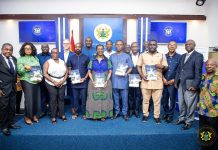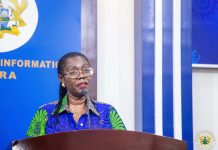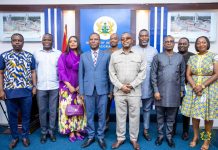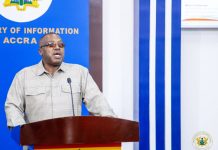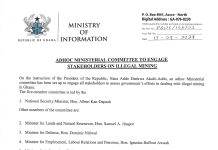Rt. Hon. Speaker,
I am grateful for the opportunity to make this statement.
I am here to provide the house an update on efforts by the Government to improve the safety of Journalists.
The phenomenon of attacks and intimidation of Journalists is gaining notoriety in our Republic. Data available to the Ministry of Information suggests that the trend is ascending.
Increasingly, various actors in our society – state actors, non-state actors, political parties operatives, assigns of businesses and everyday citizens are resorting to attacks and intimidation of journalists as a means of expressing their displeasure.
This is despite the fact that the freedom of the press is a cornerstone of our democracy, and the protection of those who contribute to the free flow of information should be of paramount importance to us all.
Mr. Speaker,
In 2012 the United Nations introduced the UN Plan of Action on the safety of journalists. It requires a multi-stakeholder approach, involving all the actors at the global and country level, to comprehensively address the three Ps, i.e., Prevent violence against journalists, Protect journalists in danger, and prosecute the perpetrators. Also, UN SDG 16 requires all countries to demonstrate progress in ensuring public access to information and protecting fundamental freedoms, which include the right to freedom of expression and safety of journalists.
The Plan of Action aims at creating a free and safe environment for journalists and media workers. Recommendation measures include, among other undertakings, the establishment of a coordinated inter-agency mechanism to handle issues related to the safety of journalists, as well as assisting countries to develop legislation and mechanisms favorable to freedom of expression and information and supporting their efforts to implement existing international rules and principles.
Mr. Speaker,
In line with this, the Ministry of Information first engaged with stakeholders of the media ecosystem in 2018 to design programs aimed at responding to challenges in the industry. The Coordinated Mechanism on the Safety of Journalists was birthed from that engagement. In collaboration with the National Media Commission, an office was established on 4th May 2021 to operate that mechanism under the leadership of the NMC.
The mechanism has four (4) major functions
- Regular advocacy and training of key actors including Journalists, security agencies, the judiciary and the general public on the need to uphold the safety of journalists. This also includes the steps journalists can take to protect themselves when conducting investigations, or reporting in potentially violent scenarios such as riots, demonstrations or conflict.
- Investigation and validation of reports of attacks on journalists and media houses.
- Holding of the security agencies and the judicial service accountable for the prosecution and severe punishment of persons involved in the attack of journalists or media houses.
- Publication of an annual report on the safety of journalists and efforts to punish attacks on journalists.
Mr. Speaker,
The Coordinated Mechanism on the Safety of Journalists has chalked minimal success since its inception. Under its advocacy function, the office conducted training sessions in 2019 for journalists in the Northern region.
The Ministry of Information has also been engaging the Judicial Service, advocating for severe punishment by the judiciary of persons who attack journalists and media houses. Among others, in 2022 the Ministry in collaboration with UNESCO, organised a 3-day workshop with 25 judges on freedom of expression and safety of journalists in line with international norms and regional standards and in our opinion, it was useful. The report by the office determined that the handling of Mr Kudah was excessive and unprofessional.
The National Security Ministry accordingly dissolved the SWAT teams that operated under it and returned officers to their mother agencies. Other incidents of reported attacks on journalists have also been investigated by the office, with findings conveyed to security and prosecutorial agencies for action.
Mr Speaker
Under the function of accountability, the mechanism has not been very successful. The need to hold the investigative, prosecutorial and judicial agencies accountable for the incidents reported to them, cannot be overemphasised.
In some instances, the Ministry of Information has had to intervene and make direct reports to the Ghana Police Service as well as demand accountability on the investigation, prosecution, and punishment of perpetrators. Holding the judiciary and prosecution accountable on a sustained basis must be done.
In conclusion, Mr Speaker permit me make three requests which will help for greater success in operating this mechanism.
- It will be helpful for Parliament to assist in holding the agencies accountable for the incidents that have been reported to them. I call on this house to partner the NMC in this effort.
- Closer collaboration among stakeholder groups in the public communications sector is required. As we have argued from the Ministry of Information, no single stakeholder group can successfully tackle this issue on its own. Greater Collaboration and cooperation is what is required.
- Mr Speaker, additionally, the NMC requires more resources to succeed at implementing the mechanism. The Ministry of Information has supported with its limited resources.
We are grateful to our development partners like UNESCO who have supported the NMC in this endeavor.
But we urge more support from our development partners and from the central budget. If we do not resource the constitutionally established independent National Media Commission to implement this mechanism, all our talk and best intentions again will be in vain.
I call on the special budget committee of Parliament to advocate for more resources for the NMC to implement this. A well-funded mechanism is essential to provide the tools, training, and support needed to enhance the security of our journalists as they carry out their vital role in society.
Mr. Speaker,
The safety of journalists is not negotiable. Journalism is not a crime. It is a major national service necessary for the advancement of our democracy. We must invest more resources, advocate for support, strengthen collaboration, as well as hold the police and judicial service accountable for the attacks we have reported to them. These will go a long way to deepen our democracy and strengthen our society.
Thank you.

